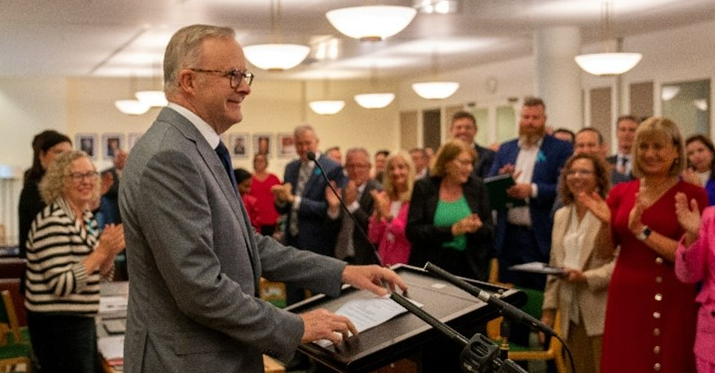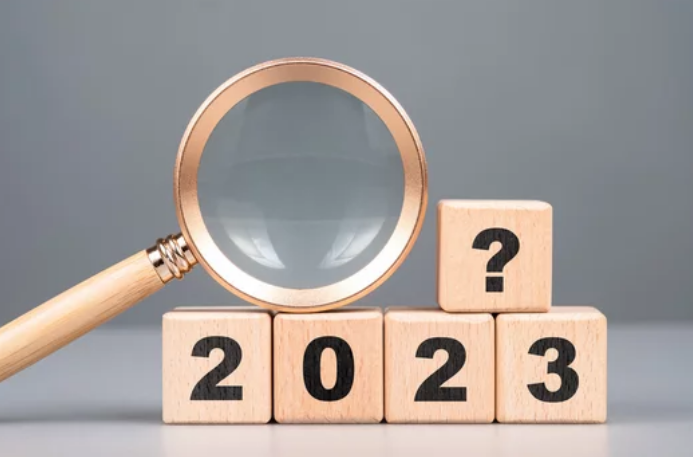Prime Minister, the Hon Anthony Albanese MP, has started the political year with a bang. Since the first sitting week for the 47th Parliament on Monday, the 6th of February, the PM has hit the ground running to deliver the Labor Government’s plans for 2023.
Alongside insights from his first Address for the year at the National Press Club of Australia yesterday, the Nexus Team has compiled an overview of the Labor Government’s plans for the year according to Prime Minister Albanese himself.
Who is Anthony Albanese?
Born in Camperdown, New South Wales in 1963, Prime Minister Albanese grew up in public housing and was raised by his single mother. He attributed his mother with instilling in him his core belief in social justice and fairness and a life-long loyalty to the values of the Australian Labor Party, which the Prime Minister joined at the age of fifteen.
Prime Minister Albanese has a Bachelor of Economics for the University of Sydney and, before entering politics, worked as a Bank officer for Commonwealth Bank from 1980 to 1981. He also worked as a research officer to the then Minister for Local Government and Administrative Service, the Hon Tom Uren MP from 1985 to 1989 and as a Senior Policy Advisor to the then New South Wales Premier, the Hon Bob Carr MP from 1995 until 1996.
In politics, the Prime Minister is a progressive member of the Labor Party and aligned with the left faction alongside Foreign Affairs Minister Penny Wong and Health Minister Mark Butler. He was first elected to Parliament to represent the New South Wales seat of Grayndler in 1996. Prime Minister Albanese has held ministerial portfolios in Infrastructure, Transport and Tourism, and became Leader of the House from 2008 to 2013. In 2013 he was the former Deputy Prime Minister, and he then became the Leader of the Opposition following the 2019 Federal Election.
The Prime Minister resides at the Lodge with his partner Jodie Haydon, a woman’s advocate and financial services professional and has a pet cavoodle named ‘Toto’.
Life and Leadership as Prime Minister
On Saturday, the 4th of February, Prime Minister Anthony Albanese sat down for an interview with Katharine Murphy on the Guardian’s Australian Politics Podcast, a show he regularly appeared on before becoming PM.
Of interest in the programme, Prime Minister Anthony Albanese described his surreal experience adjusting to life as Prime Minister. In particular, he mentioned entering the second level of the Lodge for the first time and his surprise at the sheer level of security and advanced planning needed during daily life. He said it had become much harder to go out and buy a bike pump, shop for Christmas presents or pop into a pub for beer with mates.
In an interview with the Daily Aus, when asked what the most important traits are to have in a Prime Minister, he responded that kindness and ‘telling it straight’ to the people were the characterises values in leadership and is consciously trying to embody. Prime Minister Albanese said he would leave it up to others to identify his character and leadership weaknesses as Prime Minister of Australia.
Prime Minister Albanese has described his leadership style as collegiate, where he is actively trying to promote an ensemble-style leadership community in Government. He has immense respect for and faith in his Ministry, Cabinet, MPs and Caucus and wants to maximise their positions and value in running the nation. This point has also been reinforced by the Prime Minister in numerous public and private discussions and forums.
Views on the Voice
During his keynote speech at the 2023 Chifley Research Conference on Saturday, the 5th of February, Prime Minister Albanese called for the public to embrace the Voice as it could be a practical way to Close the Gap and improve lives and can become a proud achievement in national unity. Nexus team members noted that he reiterated that the Voice won’t administer funding nor deliver programs. He also stated that the Referendum Working Group has also outlined that the Voice will not have any veto power over decision-making.
Prime Minister Anthony Albanese spoke about the success of the 1967 Referendum and that Australians recognise that democracy is dynamic and the constitution can be modernised. He urged the generation of 2023 to do one better than our parents and grandparents and declared the new referendum was about recognition and consultation.
- Recognition – an acknowledgement of country at the beginning of public events embraced by the community: in schools and childcare centres, local councils and sporting clubs. This a simple, humble reminder for Australians that we are sharing our continent with the world’s oldest living culture.
- Consultation – the vital and practical idea that Aboriginal and Torres Strait Islander people must have a say in the policies and decisions that affect their lives.
The Prime Minister has also compared the referendum to bring Voice to Parliament to a sporting Grand Final. There is a chance of losing, but that does not mean you don’t play and forfeit the match. “It would be forfeiting the opportunity for recognition in the form in which Aboriginal and Torres Strait Islander People are asking for.”
He has claimed that legislation for the Voice would be delivered before the end of March, and the draft wording would be debated during this sitting period. A Parliamentary Inquiry with opportunities for public submissions will occur for six weeks, and then during the budget sessions from May to June, the amended draft will be debated and voted on and potentially passed. This leaves the referendum to occur within this timeline from September to December.
Major Policy Interests
The Prime Minister has spoken on the importance of the Housing Accord, an agreement between the housing construction industry, social and housing groups, community housing groups, and state and federal governments, explaining that it will help ease the housing issue. Based on advice from the Treasury and private sector analysts, all housing reforms from the current Labor Government will aim to increase the housing supply.
Prime Minister Albanese and his Government are also keen to establish a process for mental health reform, including creating bodies to advise the government on these reforms and future policy decision-making. The Prime Minister has highlighted that an increase in mental health funding inherited from the previous coalition 2022/23 Budget will be used in conjunction with further funding of their own in the upcoming 2023/24 October Budget to provide more support.
The Government has a plan to support the transition towards renewable energy and is underway in developing a national pathway to lower emissions. The Prime Minister used his visit to a zinc refinery in Townsville as a positive example of this sustained shift towards renewable energy in Australia. The zinc refinery, the largest in the South Hemisphere, has over a million solar panels helping power the operation. In the long-term, the refinery is looking into hydrogen power, but for the short term, at using gas. Prime Minister Albanese used this in rhetoric as a practical, real solution when moving forward towards renewable energy. The Government is looking for realistic and stable solutions for the transition in the energy sector.
The Prime Minister received the Defence Strategic Review on Tuesday, the 14th of February and highlighted the Review’s significance in helping the Government assess the assets needed for Australia to defend itself in this increasingly volatile environment. He claimed that while defence spending will not be decreased in the upcoming budget, there will be a re-evaluation of where funds are allocated. “It’s not necessarily just about ‘we spent so many dollars’, but ‘was that the best use of every dollar?”
International Relations
The beginning of the political year in 2023 has been an excellent opportunity for Prime Minister Albanese to meet with international leaders and representatives and personally strengthen Australia’s diplomatic bonds, which have been a focus since May 2022.
On Tuesday, the 7th of February, the Prime Minister welcomed the Prime Minister of the Democratic Republic of Timor-Leste, His Excellency General Taur Matan Ruak, to Australia as a Guest of Government for the week. In Canberra, the two leaders discussed Australia’s partnership with Timor-Leste and opportunities for strengthening our economic, security and regional cooperation.
The Prime Minister also welcomed Rt Hon Chris Hipkins to Australia during the New Zealand politician’s first international visit as Prime Minister. Mr Albanese gave Prime Minister Hipkins some of his favourite records by artists Thelma Plum, Gang of Youths and Alex the Astronaut. In return, he received a greenstone Pounamu shaped like a hook, which signifies good luck and safe travels over water.
He also oversaw the deployment of an Australian urban search and rescue team of up to 72 people to Türkiye to assist local authorities after the devastating 7.5 magnitude earthquake and the initial pledge of $10 million in aid for the nation’s emergency response and recovery efforts.
Prime Minister Albanese met with Indonesian Defence Minister Prabowo Subianto and Foreign Minister Retno Marsudi during their visit to Canberra and confirmed that he would visit the United States of America at least twice in 2023. He will travel to the States in mid-March and October or November for the APEC meeting in San Francisco. The Prime Minister has also reaffirmed that Australia would host leaders from the USA, US, Japan and India during the third in-person Quad Leaders’ Summit this year.
National Press Club Address
Prime Minister Albanese spoke at the National Press Club of Australia on Wednesday, the 22nd of February, for his first Address of the year.
Stability, confidence and security. These worlds underpinned the focus of most of Prime Minister Albanese’s address. The importance of AUKUS and its benefits was also emphasised. He claimed that investing in sovereignty capability in both defence and the broader economy will strengthen regional security and international relations. “Security in the nation, confidence in the economy, stability in lives.”
He also raised that weaknesses and previous coalition policy failures have been revealed and expounded by global shock crises such as the COVID-19 pandemic, the Russian invasion of Ukraine and natural disasters. At the heart of the Government’s agenda for the year is its ability to be prepared and effectively respond to these crises and reform the nation to protect against these issues for the future.
The Prime Minister confirmed that the unclassified version of the report from the Defence Strategic Review would be released alongside the Governments formal response before the Budget in May. On the Review and defence spending, the Government promises to focus on closing capability gaps and delivering the resources Defence needs to defend the nation and deter potential aggressors.
Prime Minister Albanese underlined that international engagement and rebuilding Australia’s influence and reputation on the world stage is an essential aspect of the Government’s approach to national security.
Prime Minister Albanese reaffirmed his confidence in AUKUS and the delivery of the nuclear submarines. He also stated that the Government’s emphasis on collaboration within AUKUS would help enhance the common interests of the US, UK and AUS and help these nations uphold institutions that secure regional and global interests. To become a respected voice in global discourse and contribute to regional security, the Prime Minister said Australia is required to uphold promises to act on climate change issues and strengthen advanced manufacturing and sovereign capability.
The importance of growing the science, IT, technology and cyber industries was also mentioned as a central aspect of economic and defence security. The Prime Minister will visit Sydney next week to attend the Cyber Security roundtable with industry.
Throughout the address, the significance of the Government’s National Reconstruction Fund to build a more resilient and diversified economy and reform the Safeguard Mechanism to lower emissions was accentuated. These initiatives from the Government, as well as other policy issues, showcase that the Prime Minister and his Government believe that national security and economic sovereignty are intertwined and that their priorities are to give Australia the capacity to stand on its own feet and grow and create industries over the long term.
Tweet of the Week:

Latest posts by Nexus APAC (see all)
- United Kingdom General Election 2024: An Overview - April 15, 2024
- Australian Voters Go to the Polls - February 26, 2024
- Secretaries of Federal Departments – An Overview - February 1, 2024



